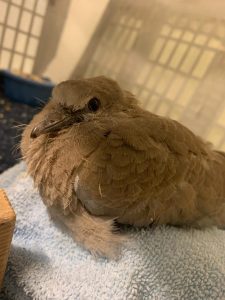Support Us
Since 1979 more than 140,000 animals have been treated by Wildlife Rescue.
Thanks to the support of individuals like you, Wildlife Rescue can provide a lifeline for animals in distress.
Have you ever woken up to a repetitive cooing sound outside your window at the crack of dawn? Well, this loud cooing sound could very well belong to the exotic, Eurasian Collared-Dove, an attractive bird with pale grey plumage and a unique crescent-shaped black band at the nape who has become a familiar sighting around British Columbia.
Over the last 10 years, the Eurasian Collared-Dove who often is mistaken for a pigeon has become a frequent visitor and resident on the west coast of Canada. Their history originates from Asia to the Bahamas in the 70’s and slowly into the United States where they were found in Florida and moving further into other parts of North America. These exotic birds are still scarce, but the numbers are increasing as bird watchers are noticing their presence throughout the lower mainland, Fraser Valley, Okanagan, and along the coast.

Eurasian Collared-Doves are adaptable to both urban environments and suburban settings like residential homes where they find access to bird feeders and seed sources. They are also found searching for food on farms and fields where they feed on an abundance of grain, millet, sunflower, milo, and wheat. The milder temperatures and food source availability in British Columbia allow these birds to stay year-round.
Male partners are known to scope out nest sites in trees and on buildings, once a spot is found they show their female partners using a low-pitched slow coo-coo call. Once the site is decided upon it takes parents 1-3 days to build a nest 10 or more feet above the ground. Parents use natural materials including twigs, grass, roots, feathers, and wool to ensure comfort and safety for their nestlings. Eurasian Collared-Doves reuse their nests for multiple broods throughout the year.
Recently, a juvenile Eurasian Collared-Dove was rescued by a kind-hearted Samaritan after it was found sitting on the sidewalk without help, emaciated and without parents.
The Samaritan acted quickly once he discovered the young nestling was extremely lethargic and quickly brought him to Wildlife Rescue hospital for supportive care. Upon the initial intake assessment and health check Wildlife Rescue staff and volunteers suspected the orphaned juvenile was likely without parents for 24-48 hours, a thorough blood examination showed low protein, another indication that the juvenile was without food for some time. Eurasian Collared-Dove comes from the columbiform family and is an altricial species that require intensive care from their parents before they can leave their nest.
Due to their natural history and parental behavior, juvenile Eurasian Collared-Doves receive nutrition and supportive care from the parents during this early stage. The young leave the nest approximately 15-20 days and are tended by parents for another week. Both parents feed young crop milk also known as pigeon milk which is the secretion from the lining of the crop of parent birds that is regurgitated to young birds. To mimic this natural behavior, Wildlife Rescue staff prepare a rich tube-fed elemental diet and fluids to increase blood values approximately 2- 4 times a day.
Staff and volunteers are responding to the initial needs of this sensitive juvenile by providing a supportive environment with a soft bottom, a soft nest and enrichment. To prevent parasites and fungal infections the juvenile is receiving antiparasitic treatment and supplemental nutrients for healthy development.
Over the last 10 days, the juvenile is regaining his strength and showing healthy signs of development through weight gain, healthy feathers and slowly becoming active and alert. Wildlife Rescue staff and volunteers will continue to monitor the
The Eurasian Collared-Dove is protected under the Federal Migratory bird act. Should you come across a bird in distress or unsure what to do please contact our Support Centre for assistance.
Support your local wildlife today